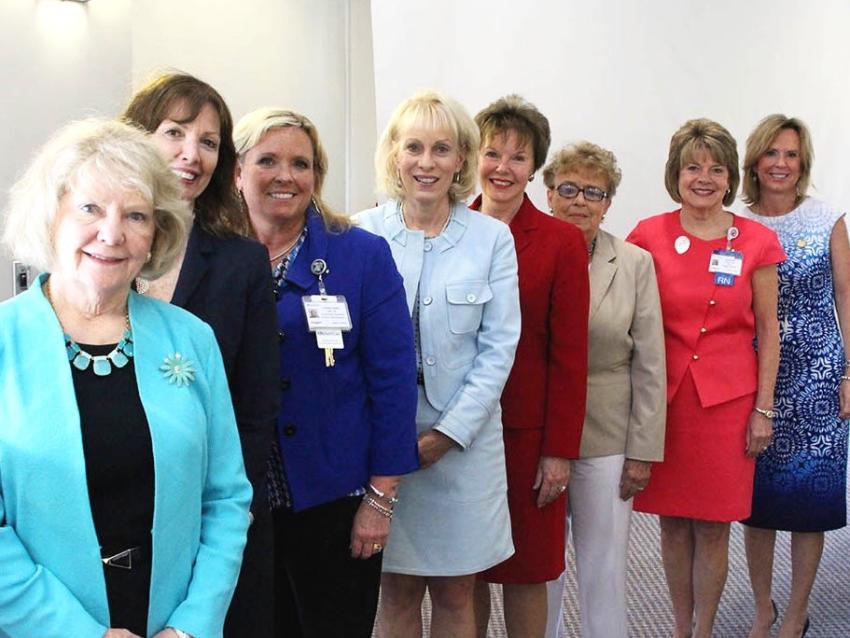
First DNP Program in Nation Holds First DNP Faculty Conference in Region
Pictured above from left to right: Drs. Patricia Howard, Mary Brennan, Colleen Swartz, Karen Hill, Ann Cary, Carolyn Williams, Dean Janie Heath and Sheila Melander.
The University of Kentucky College of Nursing, home to the first Doctor of Nursing Practice (DNP) program in the nation, held the first DNP Faculty Conference in the region on June 16-17, 2016 in the Charles T. Wethington Building.
DNP faculty traveled from across the country from states such as Minnesota, Texas, Virginia and more to hear from several national speakers and participate in four sessions that examined strategies to enhance the competency of DNP graduates. Among the invited speakers were New York University Clinical Associate Professor Mary Brennan, DNP, ACNP-BC, ANP, CNS, RN and University of Missouri-Kansas City School of Nursing and Health Studies Dean and Professor Ann Cary, PhD, MPH, RN, FNAP. Nurse leaders from the College, Norton Healthcare, UK HealthCare and Baptist Health also spoke as well as three UK DNP graduates: Danielle McPeak, DNP, APRN, NP-C; Leslee Bertram, DNP, APRN, PNP-BC; and Julianne Evers, DNP, RN, CCRN.
“The large number of nursing faculty representing the wide spectrum of specialties in attendance shows the relevance of the first Doctor of Nursing Practice Faculty Conference to today’s health care environment,” says Hazel Chappell, director of the College of Nursing Office of Continuing Education (CE). “The need for DNP prepared nurses has grown rapidly and we needed to respond to this growth with an educational opportunity for the faculty who educate these future nurse leaders.”
UK Professor and Dean Emerita Carolyn Williams, PhD, RN, FAAN gave the keynote address and Professor Emeritus Marcia Stanhope, PhD, RN, FAAN served as the conference facilitator.
Dr. Williams developed the College’s DNP program in 2001 when the terminal degree for advanced practice was the MSN degree. The program launched in response to a need for new knowledge in the face of a rapidly changing health care environment. Since then, the DNP movement has grown considerably: in 48 states, more than 260 programs are enrolling DNP students and more than 60 DNP programs are currently in the planning stages.
Formerly the president of the American Academy of Nursing, Dr. Williams has held many leadership roles and appointments, including one from President Carter as a nurse member of the President’s Commission for the Study of Ethical Problems in Medicine, Biomedical and Behavioral Research; and membership on the Preventative Services Task Force, U.S. Department of Health and Human Services. Her practice and research interests are in public health nursing, community-focused health programs and the use of epidemiological strategies in health services management and evaluation.
Dr. Stanhope served as an administrator, manager and faculty member at the UK College of Nursing for 30 years and co-directed the DNP program from its inception. Currently a nursing associate for Tuft Associates Inc., she consults with national, state and local agencies, schools and colleges of nursing. Her research on community health and administration has been widely published, and her book “Public Health Nursing: Population-Centered Health Care in the Community (8th edition) continues to be a standard text in the community health nursing field. Among her many accomplishments are the American Nurses Credentialing Center’s President’s Award.
“The College is at the forefront of the DNP movement because of living legends like Carolyn and Marcia,” says Dr. Janie Heath, dean and Warwick Professor of Nursing. “Their expertise is truly the gift that keeps on giving!”
The College of Nursing DNP Program aims to tackle the shortage of medical professionals through the development of advanced competences for a complex practice and research utilization for the improvement of clinical care delivery, patient outcomes and system management. Graduates are experts in designing, implementing, managing and evaluating delivery systems and are prepared to lead at the highest clinical and executive ranks.
The College is accredited as a provider of continuing education by the American Nurses Credentialing Center’s Commission on Accreditation (ANCC).
